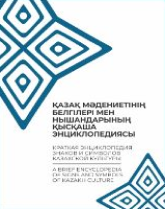




In every traditional culture there are calendrical holidays placed on the days of the equinox. Among the Kazakhs, experts note the following: Nauryz (spring), Kymyzmūryndyq (summer), women’s festival Shashyratqy (autumn), Soğym basy (winter). However, even in this cycle there may be temporal variations due to different climatic cycles in geographically distant regions of the vast settlement area of the Kazakhs.
The word “Nauryz” comes from the ancient Iranian combination of two words: nou (new) and rouse (day). This holiday, which has its origins in the canonical framework of Zoroastrianism, is a calendrical-seasonal event that reverberates from year to year and the beginning of the solar chronology. Nauryz marks the beginning of the economic cycle, and with it a complex of rites and rituals of transitional character.
Summer months – summer, which come after Nauryz, associated with good, and winter / winter months with evil and the arrival of the holiday was considered the day of victory of the first – warm summer. Before celebration of Nauryz ancient Turks cleaned ponds, springs, wells – the nature was purified by good and purity. On this holiday, all offences were forgiven, and those who were at odds, inevitably reconciled. On the night before Nauryz, it is believed, Kydyr-ata came and brought good luck. Therefore, on the eve of Nauryz, on the night of waiting for his arrival, all calves and bowls were filled with milk, airan, spring water – sacred drinks. In Nauryz Kazakhs say to each other: “Aq mol bolsyn” (a lot of white), figuratively wishing well-being and happiness.


